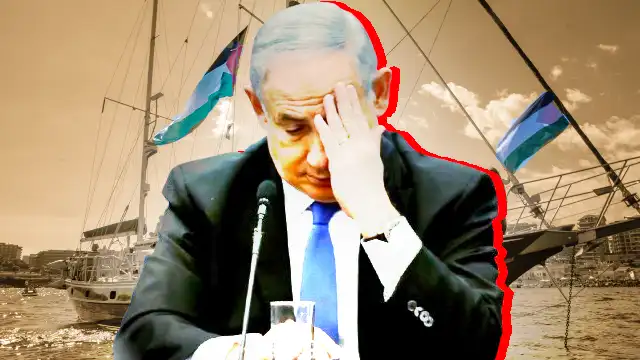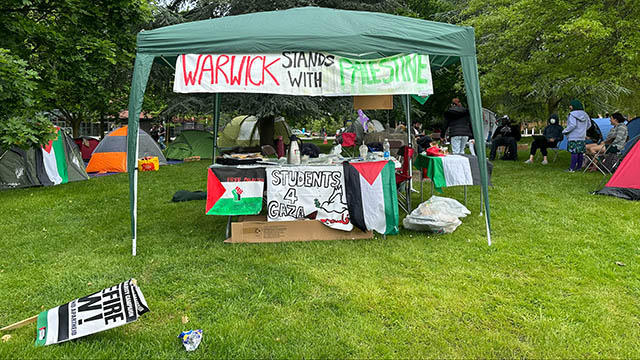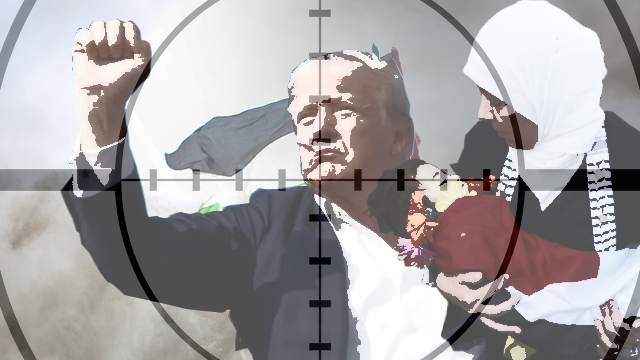Spanish courts face a landmark war crime complaint against Israeli Prime Minister Benjamin Netanyahu and senior Israeli officials following the violent interception of a humanitarian vessel bound for Gaza.
Sergio Toribio, the sole Spanish crew member aboard the Freedom Flotilla boat Madleen, has filed criminal charges that could trigger international arrest warrants for Mr Netanyahu and his military commanders.
The legal action represents a significant escalation in efforts to hold Israeli leadership accountable for attacks on civilian humanitarian missions.
The complaint, submitted to Spain’s National Court alongside the Committee for Solidarity with the Arab Cause, invokes universal jurisdiction principles that enable Spanish courts to prosecute grave international crimes regardless of location.
This legal mechanism has previously challenged powerful figures and could now threaten Israeli officials with prosecution across European jurisdictions.
The case emerges from Israel’s June 9th assault on the Madleen, a civilian vessel carrying life-saving aid to Gaza’s besieged population.
Israeli naval commandos intercepted the boat more than 100 nautical miles from shore in international waters, forcibly detaining all 12 crew members, including Swedish climate activist Greta Thunberg and Member of the European Parliament (MEP) Rima Hassan.
Madleen mission: Humanitarian aid meets brutal force
The Madleen departed Catania, Sicily, on June 1st 2025, as part of the Freedom Flotilla Coalition’s ongoing efforts to break Israel’s blockade of Gaza.
The civilian vessel carried essential supplies for Gaza’s population, continuing a tradition of international solidarity that has repeatedly challenged Israeli maritime restrictions.
The Israeli Navy’s elite Shayetet 13 unit executed the interception using drones, chemical substances and so-called non-lethal weapons.
The operation demonstrated Israel’s willingness to employ military force against unarmed civilians engaged in humanitarian activities.
All crew members were forcibly transferred to Israeli territory before being deported, constituting what legal experts describe as clear violations of international humanitarian and maritime law.
The assault followed familiar patterns established during previous Freedom Flotilla operations.
Israeli forces have consistently targeted civilian vessels attempting to deliver aid to Gaza, employing disproportionate force against international volunteers and humanitarian workers.
These actions reflect broader policies designed to maintain Gaza’s isolation while deterring international solidarity efforts.
Ms Thunberg’s presence aboard the Madleen heightened international attention on Israel’s interception tactics.
The prominent climate activist’s detention alongside other international figures underscored how Israel’s policies affect global civil society figures advocating for Palestinian rights.
MEP Ms Hassan’s involvement further emphasised the diplomatic implications of Israeli actions against European officials.
What strategy does the war crime complaint against Netanyahu employ?
The war crime complaint against Mr Netanyahu employs legal strategies proven effective in Spain’s 2010 Mavi Marmara case, where the National Court accepted jurisdiction over Israeli attacks on Gaza-bound civilian vessels.
That precedent established Spanish courts’ willingness to challenge Israeli impunity through universal jurisdiction mechanisms.
Legal teams have named specific individuals responsible for the Madleen assault: Prime Minister Netanyahu, Defence Minister Israel Katz, Navy Commander Vice Admiral David Saar Salama, senior Shayetet 13 officers, and Israeli Army spokesperson Daniel Hagari.
This comprehensive approach targets both political leadership and military commanders involved in planning and executing the operation.
The complaint characterises Israeli actions as part of systematic repression against nonviolent humanitarian missions to Gaza.
Legal experts argue this pattern demonstrates deliberate attempts to criminalise international solidarity with Palestinian civilians.
Spain’s courts must now determine whether these actions constitute prosecutable war crimes under international law.
Universal jurisdiction principles enable Spanish courts to pursue cases involving grave breaches of international humanitarian law regardless of where the crimes occurred or the perpetrators’ nationality.
This mechanism has previously targeted officials from various countries, establishing precedents for prosecuting powerful figures who might otherwise escape accountability.
International implications and accountability mechanisms
The legal action requests international witness testimony and calls for arrest warrants against all named Israeli officials.
Such warrants would restrict their international travel and potentially subject them to arrest in countries recognising Spanish court jurisdiction.
This prospect creates significant diplomatic and personal consequences for Israeli leadership.
The war crime complaint against Mr Netanyahu reflects growing international frustration with Israeli policies toward Gaza and the treatment of humanitarian missions.
European civil society organisations have increasingly challenged Israeli actions through legal mechanisms when diplomatic efforts prove insufficient.
Spanish courts provide accessible venues for such challenges, given their established universal jurisdiction jurisprudence.
Moreover, Spain itself has taken proactive measures to block weapons sales to Israel.
Spanish Prime Minister Pedro Sanchez has accused Israel of carrying out a “genocide” in Gaza and has called the situation catastrophic.
Mr Sanchez is one of the very few senior European officials to have condemned Israel’s actions in Gaza.
International law experts note that successful prosecution would establish important precedents for holding state officials accountable for attacks on humanitarian missions.
The case could strengthen protections for civilian vessels engaged in legitimate aid delivery while deterring future military actions against unarmed international volunteers.
The complaint emphasises defending global civil society’s right to act in solidarity with oppressed populations.
Legal teams argue that allowing Israeli attacks on humanitarian missions without consequences undermines fundamental principles of international cooperation and human rights protection.
Spanish courts must now weigh these arguments against Israeli claims of legitimate security concerns.
The filing of the war crime complaints against Mr Netanyahu comes amid Israel’s prosecution in the International Court of Justice, following a case by South Africa.
Broader context of Gaza solidarity movements
The Madleen incident represents one episode in ongoing international efforts to support Gaza’s population through direct aid delivery.
Freedom Flotilla operations have repeatedly challenged Israel’s maritime blockade, drawing international attention to Gaza’s humanitarian crisis while testing the boundaries of international law.
Israeli responses to these missions have consistently involved disproportionate force against civilian vessels.
The 2010 Mavi Marmara assault killed nine Turkish activists, generating international condemnation and legal proceedings across multiple jurisdictions.
Subsequent incidents have followed similar patterns of military force against unarmed humanitarian workers.
European participation in Freedom Flotilla missions reflects broader continental frustration with Israeli policies and American diplomatic protection of Israeli actions.
Civil society organisations across Europe have increasingly organised direct action campaigns supporting Palestinian rights when official diplomatic channels prove ineffective.
The involvement of prominent figures like Ms Thunberg and Ms Hassan demonstrates how Palestinian solidarity has attracted support from diverse international movements.
Climate activists, parliamentarians and human rights advocates have found common cause in challenging Israeli policies while supporting Gaza’s civilian population.
Spanish civil society leads international accountability efforts
Spanish civil society’s commitment to Palestinian rights has manifested through consistent legal challenges to Israeli impunity.
The Committee for Solidarity with the Arab Cause has pursued multiple cases targeting Israeli officials while advocating for Palestinian rights within Spanish political discourse.
The current war crime complaint against Mr Netanyahu builds on decades of Spanish solidarity with Palestinian liberation movements.
Spanish civil society organisations have maintained consistent support for Palestinian rights while challenging Israeli policies through political advocacy and legal action.
This sustained commitment has created institutional knowledge and legal expertise essential for complex international prosecutions.
Legal teams emphasise that successful prosecution would defend international humanitarian law while upholding Palestinian dignity and rights.
They argue that Spanish courts have both jurisdiction and responsibility to address grave breaches of international law, regardless of political considerations or diplomatic pressure from allied governments.
“This lawsuit is not only about securing justice for a Spanish citizen who was illegally detained—it’s about defending the right of global civil society to act in solidarity with oppressed peoples,” the legal team stated.
The case represents a significant escalation in efforts to hold Israeli leadership legally accountable for policies affecting Palestinian civilians and international humanitarian workers.
As Spanish courts consider the war crime complaint against Mr Netanyahu, they face decisions that could reshape international accountability mechanisms while affecting Israel’s ability to operate with impunity against humanitarian missions supporting Gaza’s besieged population.
Join our channels on Telegram and WhatsApp to receive geopolitical updates, videos and more.





